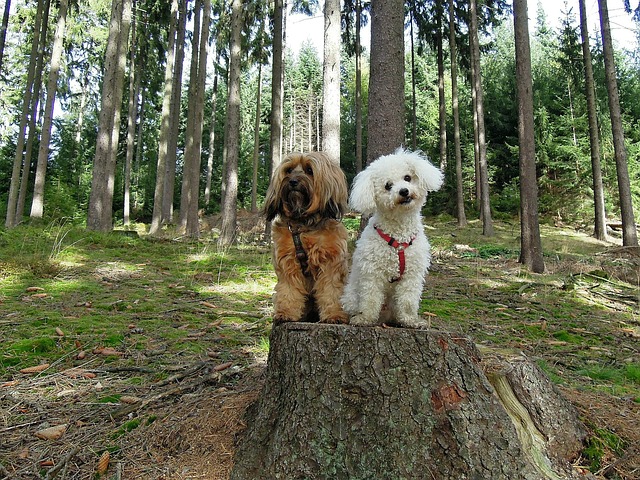Healthy and well-groomed Cavachons don’t smell at all.
If your Cavachon does smell, there are a few possible causes, but all of them should be addressed with a veterinarian to ensure that your pup is healthy and irritation-free.
Do Dogs Smell?
If you have never lived with a dog before and walk into a home where they have a dog, you will notice a “dog smell.”
The dog has a unique scent like all living animals, and while dog lovers rarely detect it, non-dog owners do.
Have you ever slept on your spouse’s pillow? It has a scent unique to them, just as yours has a scent unique to you.
This idea is the same as dog scents – a neutral but identifying odor.
Where does that smell originate? It is a combination of natural secretions that the body makes to stay healthy.
For example, the oil that the body produces to keep skin moisturized and protected and natural pheromones.
Another smell frequently described by dog owners is the popcorn or Frito’s smell. This smell is a byproduct of harmless bacteria on your dog’s feet.
Think of your socks when you take them off after a long day at work.
While some dog owners don’t mind the Frito odor, if it does become bothersome, keeping your dogs’ feet well-trimmed and clean will help to keep it at a minimum.
Some dog breeds also have a much more pungent natural odor than others. For example, you may have heard of the “hound smell”.
This strong smell is due to bacteria that develop in the skin folds that make these dogs so cute!
But Do Cavachons Smell?
Aside from the natural “dog smell” and Frito feet, the Cavachon should not smell.
What If A Dog Has a Very Strong Smell?
If you have a Cavachon (or any other breed) that has a pungent smell, there is a good chance that something else is at work.
Some common causes of solid odors in dogs include:
- Skin Infection
- Ear infection
- Other infection
- Anal gland issues
- Supplements and medications
- Dental disease
- Other health conditions
Skin Infection
Skin infections occur most often as a secondary condition caused by other diseases.
Frequently dogs with skin allergies develop skin infections, but dogs with hormonal imbalances and autoimmune illnesses can also develop skin infections.
Some skin infection symptoms include itching, red skin, flakey skin, open sores, bleeding sores, and constant rubbing against surfaces to “scratch.”
The odor of a skin infection depends on the type of infection, but you may notice a sweet or musty smell.
Skin infections are very uncomfortable for your dog and can be symptomatic of an underlying medical condition that needs treatment ASAP.
Ear Infection
Dogs with long ears, flap ears, or dogs that spend a lot of time in or near water are notorious for developing ear infections (Labradors, we are looking at you!) Ear infections can affect different parts of the ear and can result from bacteria or yeast.
Symptoms of an ear infection include:
- Itching
- Shaking the head
- Brown debris inside the ear canal
- Reddening of the skin inside the ear
- Rubbing the ears against the ground.
The odor of an ear infection is very musty and sweet.
Ear infections are also very uncomfortable for your dog, and if left untreated, your dog can develop a hematoma on its ear and even lose its hearing!
Other Infection
Other types of infections – for example, urine infections and vaginal yeast infections can also cause unpleasant and pungent odors.
If you suspect other types of infection, you must see a veterinarian ASAP to begin treatment to prevent serious complications.
Anal Gland Issues
Another common cause of odors in dogs (especially in smaller breeds like the Cavachon) is problems with the anal glands.
The anal glands are two pea-sized sacs on either side of the anus that drop a small amount of fluid when your dog defecates.
This fluid is rich in pheromones and serves as a “message” from your dog to other dogs.
For example – in the wild, these pheromones tell a male when a female is in heat.
Smaller dogs, dogs with frequent diarrhea, and dogs with previous anal gland issues often experience difficulty with expression.
You will notice a very fishy odor as the anal sack fluid builds up in the tiny sacs.
When anal glands do not express naturally, a veterinarian technician or groomer must tell them manually.
If left anal sac blockages can abscess and rupture…you don’t want to know what happens next.
You should see your vet before a rupture occurs!
Supplements and Medications
Just like us, some medications and supplements can cause our dogs to have an unusual odor.
The most common culprit for supplement cause odor is fish oil and natural supplements that cause flatulence.
Dental Disease
Another common cause of odor in dogs is dental disease.
Older dogs and small breeds are particularly susceptible to dental disease.
The odor from dental disease is easily identifiable because the small originates in the mouth.
Dental plaque, infection, and tooth loss may also be present.
If you notice a foul odor coming from your dog’s mouth, make an appointment with your veterinarian to get your dog a dental exam and dental cleaning done.
Your vet may prescribe antibiotics to control infection, and your dog may also need teeth pulled if they are severely compromised.
You can slow down or prevent dental disease by cleaning your dog’s teeth regularly and getting a veterinary cleaning done for your dog annually.
Other Health Conditions
Other health conditions can also contribute to odor; these include:
- Diabetes
- Kidney problems
- Parvovirus
- Giardia
Cavachons Smell – Final Thoughts
Aside from a natural “dog smell” and “Frito feet” occasionally, Cavachons do not and should not smell.
If your Cavachon does smell quite intense, it may be time for a vet visit to find out the cause!

